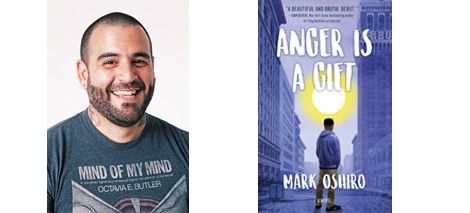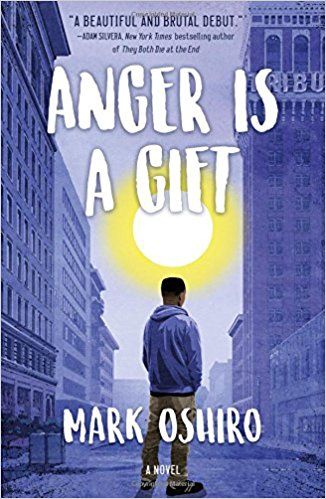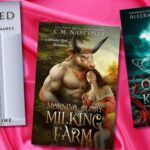
Interview with Mark Oshiro, Author of ANGER IS A GIFT
 Anger Is A Gift is a novel about grief, activism, and living despite trauma. High school student Moss lost his father several years ago to police brutality, and he hates how people define him by the incident. Then metal detectors and the police show up at his school, and Moss realizes that they have to organize against it, or more people will die.
Anger Is A Gift is a novel about grief, activism, and living despite trauma. High school student Moss lost his father several years ago to police brutality, and he hates how people define him by the incident. Then metal detectors and the police show up at his school, and Moss realizes that they have to organize against it, or more people will die.
Author Mark Oshiro started his career by reviewing fantasy and science fiction, creating the Mark Reads and Mark Watches blogs and receiving a Hugo nomination for best Fan Writer. His chapter-by-chapter takes on Harry Potter, Discworld, and other works have won readers’ hearts. His novel Anger is a Gift premiered in May 2018 from Tor Teen. When Mark wrote the first draft, he didn’t realize the story was going to become a commentary on coming-of-age while facing police brutality and systematic racism. In fact, according to the novel’s afterword, the story was planned as the first book to a science fiction trilogy.
Anger is a Gift is an intense book, filled with harsh realities about student life and about confronting trauma on a regular basis. The afterword mentions that it was conceived in 2012, in a very different genre but based on your experiences as an activist and high school student. What was your inspiration?
There are two basic things that make up the inspiration for Anger Is A Gift. I had long wanted to write something addressing resource officers and the presence of police violence within the context of a high school. It was tied to my own experiences and observations, and I’d never seen a book about it before. But that didn’t solidify into an actual plot or story until nearly six years ago. The plot for Anger was inspired by an episode of Buffy The Vampire Slayer (specifically “Seeing Red”), which I was reviewing for Mark Watches. I wrote a scene as a sort of free-writing experience to deal with my reaction to that episode, and while some small details changed over the years, that same sequence is STILL in Anger.
“Normal was different for Moss and everyone else who attended West Oakland High.” What are your thoughts on how normalcy is arbitrary, depending on where we live?
It wasn’t until I got to college that I discovered that having a resource officer stationed on campus was abnormal. I also didn’t know that it was uncommon to watch your peers get arrested at school, to be funneled through the juvenile system for fairly minor offenses. I knew it was wrong, but I assumed it was the standard. Once I left the insular community I grew up in, I had to rethink what was normal. And this is the case for tons of kids across the US! I recently did a school visit in the Bronx, and these kids went through metal detectors and were subjected to invasive searches daily, and that’s their normal. I wanted to write a book about that and how for many communities—usually ones that are disproportionately poor and Black/brown—our schools don’t look like the others.
It seems that the main problem comes from police and authority figures not listening to students and addressing their needs, instead imposing their brand of cruelty upon bystanders and the people they’re supposed to protect. I was reminded of Tumblr posts that would detail underfunded classrooms and violent protests. How hard was it to convey this reality in fiction, given how brutal it is to read?
It’s interesting because I found many of those scenes detailing the state of West Oakland High to be incredibly easy to write. Sometimes, being authentic just means being honest, and it wasn’t hard to talk about having few supplies, or going to a school that’s falling apart, or being under the weight of the scam of state testing and real estate taxes. That hypocrisy is on display in this book because, again, it’s the reality for a lot of kids in our nation. Money is spent on “protecting” them, but isn’t spent on actually educating them.
The novel is very intersectional, with a black lead who has a nonbinary friend, a Latino love interest who is delightful, and an epileptic student who is targeted for the crime of speaking out. How much research did you have to do into the many lanes that the novel explores? What advice do you have for POC authors who want to take the same route?
Some of the book required research, particularly for experiences that I don’t have. After writing that first scene in response to Buffy, I spent months split between the main branches of the Oakland Public Library and the San Francisco Public Library gathering research on a number of issues. Most of that appears in the technology you see in the novel, as well as the logistics of protesting and the history of police brutality that other characters reference. When it came to writing identities and experiences that were not my own, I found a lot of great resources online. I always recommend Writing The Other by Nisi Shawl and Cynthia Ward as a fantastic starting place. But research can only go so far, and so I recommend that authors rely on the editorial process. That includes beta readers or critique partners; your own editor if you’ve got a publishing deal; and please, PLEASE utilize sensitivity readers. I’ve been doing sensitivity reads for well over two years now, and it’s an incredible service that helps make your story better. Treat sensitivity reads just like any other edit and accept that you’re paying someone to give you guidance, not attack you personally.
You’ve been nominated for a Hugo for your reviews on fantasy and science fiction in Mark Does Stuff. How does it feel to be on the other side of the equation, as a fiction writer and not a reviewer?
It’s very strange! I have all the spoilers for the first time in my life, and because the Mark Does Stuff universe is incredibly anti-spoiler, I’m not used to being on the other side. But I’m glad that my first novel is coming after having spent nearly a decade doing literary analysis. I’ve devoted a significant portion of my life to picking apart plot, characterization, and narrative structure, and I consider that a kind of training that has been vital to my writing career. I don’t think I could have finished a novel, let alone deal with all the massive edits it has gone through, without this part of my life.
What was the novel like when it was originally going to be part of a science fiction trilogy? What elements have changed or stayed the same between drafts?
For at least the first two thirds of Anger, the bones of the story is more or less the same as the original story. Moss was still the main character, it was still about invasive metal detectors being installed on campus, and you still had the thread of dealing with the trauma of police brutality. It’s just that there was ANOTHER giant thread on top of all of this, and I’m eternally thankful that my agent, DongWon Song, told me that the book would be better if I separated out these two stories and made them their own thing. I ended up removing all the science fiction stuff, which included a plot about MURDER ROBOTS hiding under Oakland, and focusing on the contemporary narrative. I’m very happy I did.
Do you have advice for people who are battling the despair that we can make a better world when horrible tragedies keep happening and the system seems to not change? How do we keep finding light within the darkness?
On a personal level, I am trying to be less harsh on myself and on others. It’s hard some days to find hope, and I say that as someone who has depression, anxiety disorders, and lives with the specter of PTSD hanging over me. I am much more forgiving of myself, and I am also much more willing to allow myself the tiny joys. I have picked up long-distance running again as a means to burn off some of my anxiety, and I cherish how many friends I’ve made since moving to New York City. I celebrate good books and the careers of people who are putting out positive energy into the world. And I get angry! I get angry at the world, and I find ways to direct that anger so that I can feel like I’m making a difference. Whether that’s through marching, volunteering my time and energy, or donating to worthy causes, I channel my distaste for the world into something that helps.
How can readers and writers alike change the face of publishing to release more diverse books? We need more stories like this, and authors like you.
Thank you! There’s only so much that readers and writers can do. I want readers to support who they love, obviously, and I’ve been flattered by the support I’ve gotten in the months prior to release. But it’s important that we stay critical of our own desires and enjoyment. Are we only supporting men? Only white writers? Do we celebrate abled-bodied writers giving us stereotypical depictions of ableism while ignoring those who are actually part of that community? One thing I do as a reader is make sure I’m reading at least one new author a month, and I do my best to make sure that these books are from people of communities that are under-represented in publishing. As a writer, I try to make my work reflect the world at large, and for genre stuff that’s set in another world, I still try to be as conscientious about what I’m putting out to others.
However, I think the bulk of this question should be directed at the publishing industry itself. Who gets the big, flashy deals? Which stories get promoted? Which authors are praised for their “brave” or “courageous” stories about experiences that are not their own, only for authors of those communities to be sidelined as tokens? Given that we now know that just 7% of all published authors in children’s books are Black, Latino, or Native, why is it that most of the books written about these communities are not from these communities?
The book also discusses frank issues such as mental health and finding healthy coping strategies for dealing with trauma. How important was it to show a positive example of therapy clashing with the realities that the human mind can be resistant to getting better?
I don’t know that I’d say that this is about therapy clashing with Moss so much as it’s about the logistics of mental health on a day-to-day basis. As someone who dealt with PTSD, anxiety, and depression in high school, I did not have the support system Moss does. So, I wanted to imagine what that would look like. What if his mother supported him and allowed him to be honest about his mental health? And despite that he does go to therapy, it doesn’t provide an instant solution to his issues. Instead, he learns coping mechanisms to deal with the challenge of having anxiety. I would say it’s the world that clashes with Moss more than his therapy. He’s triggered by people bringing up his history with police brutality; he’s triggered when his school escalates their demonization of their own student body. What does mental health look like in an environment like that?
What do you hope people will find when they read Anger Is A Gift?
First of all, I have a pretty sweet joke about museums and biphobia (aversion toward bisexuality and toward bisexual people as a social group or as individuals) in the book, so I hope people are pleased with that, because it’s one of my favorite moments in the whole book. I also say that because while this book is intensely personal and quite heavy at times, I never wanted things to seem hopeless. The situations might be dire, but the future isn’t. I wanted to offer hope to kids who feel stuck, trapped, isolated, and ignored. I see you. Many of us do. There is a way out for you, and perhaps Anger Is A Gift can be a roadmap for you.
What upcoming works can we expect from you?
I just released my first short story, “No Me Dejas,” a YA sci-fi tale about memory transfer and honesty. I’m in the midst of a massive rewrite on my second book for Tor Teen, which is NOT a sequel to Anger. It’s currently got a secret title that I hope to reveal soon, but what I can share now is that it is a story that combines magical realism and psychological horror while talking about what forces people to migrate from their homes. I can’t wait to share it with the world!









